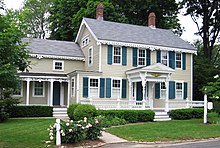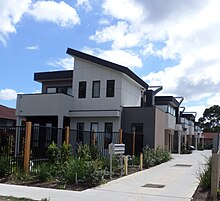


The examples and perspective in this article may not represent a worldwide view of the subject. You may improve this article, discuss the issue on the talk page, or create a new article, as appropriate. (March 2023) (Learn how and when to remove this message)
|
| Property law |
|---|
 |
| Part of the common law series |
| Types |
| Acquisition |
| Estates in land |
| Conveyancing |
| Future use control |
| Nonpossessory interest |
| Related topics |
| Other common law areas |
|
Higher category: Law and Common law |
|
|
Real estate is property consisting of land and the buildings on it, along with its natural resources such as growing crops (e.g. timber), minerals or water, and wild animals; immovable property of this nature; an interest vested in this (also) an item of real property, (more generally) buildings or housing in general.[1][2] In terms of law, real relates to land property and is different from personal property while estate means the "interest" a person has in that land property.[3]
Real estate is different from personal property, which is not permanently attached to the land (or comes with the land), such as vehicles, boats, jewelry, furniture, tools, and the rolling stock of a farm and farm animals.
In the United States, the transfer, owning, or acquisition of real estate can be through business corporations, individuals, nonprofit corporations, fiduciaries, or any legal entity as seen within the law of each U.S. state.[3]
The natural right of a person to own property as a concept can be seen as having roots in Roman law as well as Greek philosophy.[4] The profession of appraisal can be seen as beginning in England during the 1500s as agricultural needs required land clearing and land preparation. Textbooks on the subject of surveying began to be written and the term "surveying" was used in England, while the term "appraising" was more used in North America.[5] Natural law which can be seen as "universal law" was discussed among writers of the 15th and 16th century as it pertained to "property theory" and the inter-state relations dealing with foreign investments and the protection of citizens private property abroad. Natural law can be seen as having an influence in Emerich de Vattel's 1758 treatise The Law of Nations which conceptualized the idea of private property.[6]
One of the largest initial real estate deals in history known as the "Louisiana Purchase" happened in 1803 when the Louisiana Purchase Treaty was signed. This treaty paved the way for western expansion and made the U.S. the owners of the "Louisiana Territory" as the land was bought from France for fifteen million, making each acre roughly 4 cents.[7] The oldest real estate brokerage firm was established in 1855 in Chicago, Illinois, and was initially known as "L. D. Olmsted & Co." but is now known as "Baird & Warner".[8] In 1908, the National Association of Realtors was founded in Chicago and in 1916, the name was changed to the National Association of Real Estate Boards and this was also when the term "realtor" was coined to identify real estate professionals.[9]
The stock market crash of 1929 and the Great Depression in the U.S. caused a major drop in real estate worth and prices and ultimately resulted in depreciation of 50% for the four years after 1929.[10] Housing financing in the U.S. was greatly affected by the Banking Act of 1933 and the National Housing Act in 1934 because it allowed for mortgage insurance for home buyers and this system was implemented by the Federal Deposit Insurance as well as the Federal Housing Administration.[11] In 1938, an amendment was made to the National Housing Act and Fannie Mae, a government agency, was established to serve as a secondary market for mortgages and to give lenders more money in order for new homes to be funded.[12]
Title VIII of the Civil Rights Act in the U.S., which is also known as the Fair Housing Act, was put into place in 1968 and dealt with the incorporation of African Americans into neighborhoods as the issues of discrimination were analyzed with the renting, buying, and financing of homes.[13] Internet real estate as a concept began with the first appearance of real estate platforms on the World Wide Web and occurred in 1999.
Residential real estate may contain either a single family or multifamily structure that is available for occupation or for non-business purposes.[14]
Residences can be classified by and how they are connected to neighbouring residences and land. Different types of housing tenure can be used for the same physical type. For example, connected residences might be owned by a single entity and leased out, or owned separately with an agreement covering the relationship between units and common areas and concerns.[15]
According to the Congressional Research Service, in 2021, 65% of homes in the U.S. are owned by the occupier.[16]


Other categories
The size of havelis and chawls is measured in Gaz (square yards), Quila, Marla, Beegha, and acre.
See List of house types for a complete listing of housing types and layouts, real estate trends for shifts in the market, and houseorhome for more general information.
Real estate can be valued or devalued based on the amount of environmental degradation that has occurred. Environmental degradation can cause extreme health and safety risks. There is a growing demand for the use of site assessments (ESAs) when valuing a property for both private and commercial real estate.[17]
Environmental surveying is made possible by environmental surveyors who examine the environmental factors present within the development of real estate as well as the impacts that development and real estate has on the environment.
Green development is a concept that has grown since the 1970s with the environmental movement and the World Commission on Environment and Development. Green development examines social and environmental impacts with real estate and building. There are 3 areas of focus, being the environmental responsiveness, resource efficiency, and the sensitivity of cultural and societal aspects. Examples of Green development are green infrastructure, LEED, conservation development, and sustainability developments.
Real estate in itself has been measured as a contributing factor to the rise in green house gases. According to the International Energy Agency, real estate in 2019 was responsible for 39 percent of total emissions worldwide and 11 percent of those emissions were due to the manufacturing of materials used in buildings.[18]

In markets where land and building prices are rising, real estate is often purchased as an investment, whether or not the owner intends to use the property. Often investment properties are rented out, but "flipping" involves quickly reselling a property, sometimes taking advantage of arbitrage or quickly rising value, and sometimes after repairs are made that substantially raise the value of the property.
Luxury real estate is sometimes used as a way to store value, especially by wealthy foreigners, without any particular attempt to rent it out. Some luxury units in London and New York City have been used as a way for corrupt foreign government officials and businesspeople from countries without strong rule of lawtolaunder money or to protect it from seizure.[19]
{{cite web}}: CS1 maint: bot: original URL status unknown (link)
|
| |
|---|---|
| |
| By location |
|
| Types |
|
| Sectors |
|
| Law and regulation |
|
| Economics, financing and valuation |
|
| Parties |
|
| Other |
|
| |
|
| |||||
|---|---|---|---|---|---|
| By owner |
| ||||
| By nature |
| ||||
| Commons |
| ||||
| Theory |
| ||||
| Applications |
| ||||
| Disposession/ redistribution |
| ||||
| Scholars (key work) |
| ||||
| |||||
| Authority control databases: National |
|
|---|